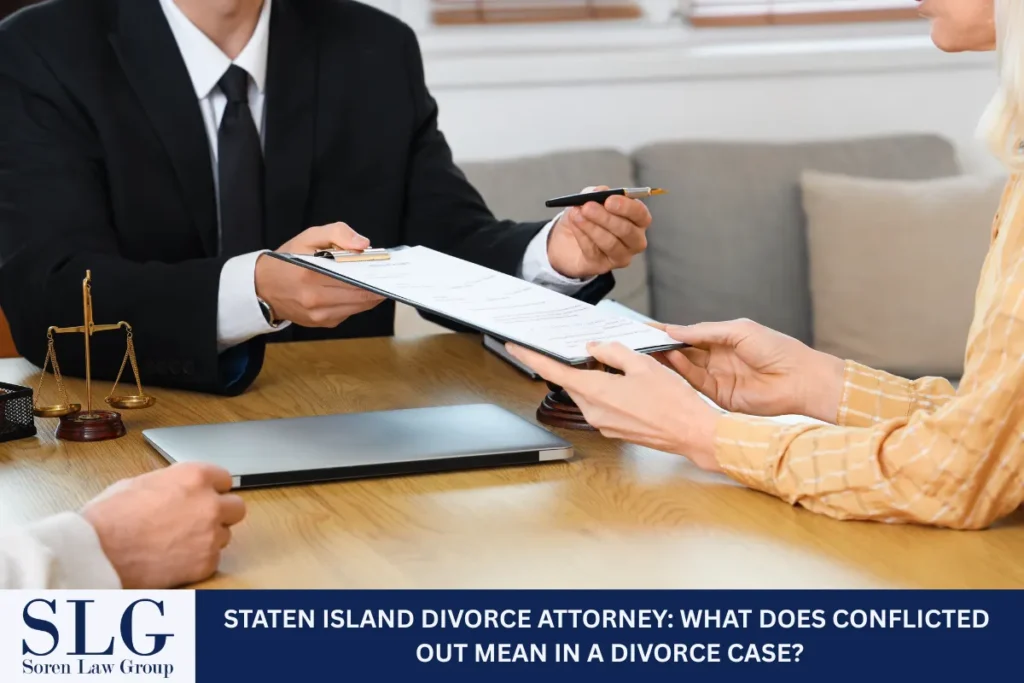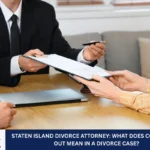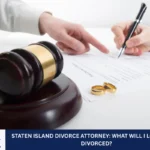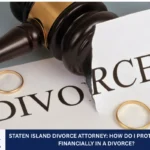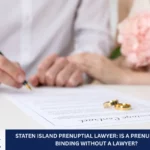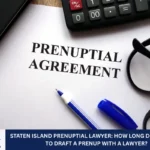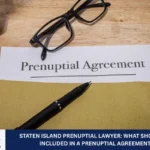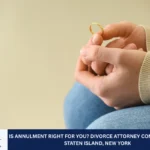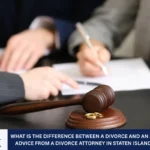When searching for a divorce attorney, many people worry about picking the right person for such an important job. But what if you’re told a lawyer can’t help because you’re “conflicted out”? Imagine needing help with your divorce, only to discover that several top attorneys can’t represent you because of a technicality. This problem often frustrates people facing divorce in Staten Island. Feeling shut out and alone while your spouse gets first choice of the best legal support only adds to the stress. Thankfully, learning how the conflict of interest system works and what you can do about it —from the attorney-client relationship to the ethical rules —gives you power. Understanding this issue helps you safeguard your rights during divorce.
What Does “Conflicted Out” Mean in a Divorce Case?
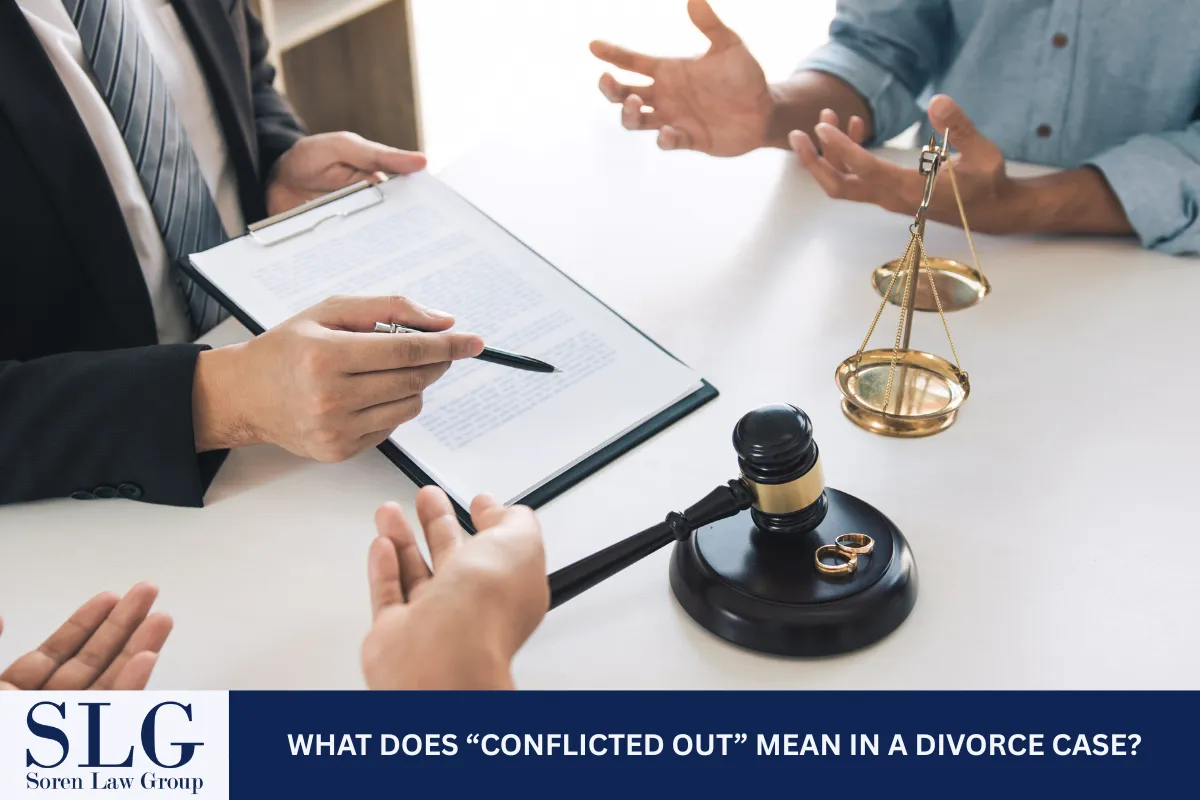
To be “conflicted out” means a divorce lawyer or firm cannot represent you because a potential conflict of interest exists. In the context of a Staten Island divorce, this usually happens when you or your spouse has shared confidential information with the same legal team or a closely related law firm. Ethical rules—such as the ABA Model Rules and New York’s Rules of Professional Conduct—require attorneys to avoid even the appearance of divided loyalty.
Let’s break it down: If your spouse has consulted with a particular divorce attorney or law firm first, about your personal situation, you may be conflicted out from using that attorney—even if you never hired them. The idea is to protect confidential communications and prevent lawyers from using secrets learned from one spouse against the other. This rule applies to divorce lawyers, family law attorneys, and their entire firms.
How Does Conflicting Out Happen in Divorce Cases?
Spouses try to identify and hire the best divorce attorney to represent their interests in the divorce process. However, sometimes people engage in a tactic called “conflicting out” or “conflict out”—intentionally consulting with several top law firms or attorneys in hopes of making them unavailable to the other spouse.
During an initial consultation, a person may share confidential information about their marriage, finances, or plans. Even if that individual doesn’t retain the lawyer, the mere act of providing details about the case may create a conflict of interest. Now, the attorney cannot represent the other spouse because it might risk revealing confidential information or compromising their impartiality.
In practice, law firms maintain a conflict log or database. Each time someone contacts the firm—whether or not they sign up—a conflict-of-interest check is conducted. If the opposing party later tries to hire the same attorney or firm, the conflict system will flag the situation.
Why Would Someone Conflict Out a Divorce Lawyer?
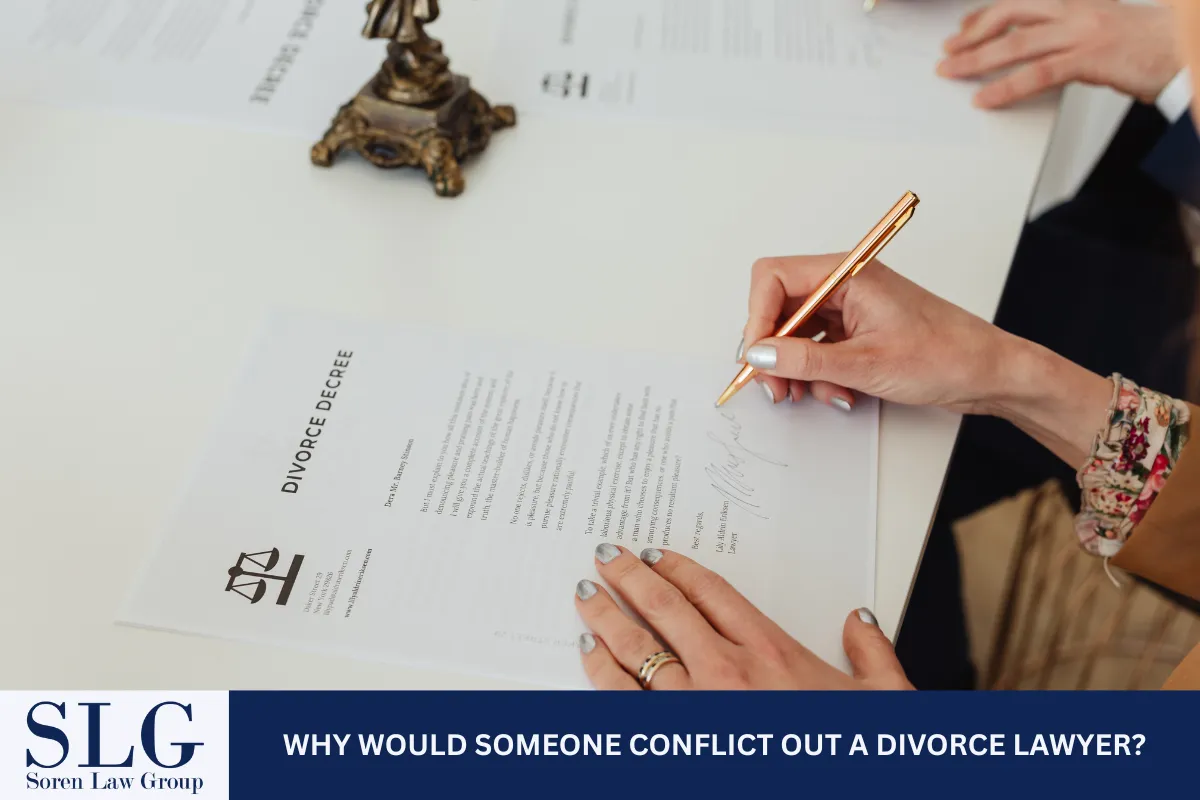
Most people seek legal advice to obtain the best support and guidance in divorce, custody disputes, property division, or spousal support matters. But sometimes, conflicting is used as a strategy. Some reasons spouses may try to conflict out attorneys include:
- Strategic Advantage: By consulting with several top-rated family law attorneys or divorce lawyers in the area, one spouse can make those lawyers unavailable to the other side.
- Limiting Opponent’s Options: The spouse who acts first potentially “locks out” the most experienced divorce attorneys, leaving fewer choices for the other spouse.
- Gathering Legal Advice: Some people believe that getting multiple legal opinions strengthens their understanding, but spreading confidential information broadly can make things messy.
While some of these reasons are legitimate, such as truly needing several opinions, conflicting out can become an abuse if used to deliberately block the other party from accessing quality legal representation.
Is Conflicting Out Attorneys a Dirty Divorce Trick?
Conflicting out can be viewed as an underhanded or “dirty” divorce trick—especially if the sole reason for multiple consultations is to cut off your spouse’s access to good legal counsel. Courts and ethics boards have increasingly scrutinized this tactic.
Some individuals go “attorney shopping” or “taint shopping”—meeting with every major divorce attorney in their community, sometimes with only the intent to poison the well for their spouse. If the law firm believes the consultations were made in bad faith or intended solely to block representation, that could factor in a court’s decision if a motion to disqualify is filed.
Ethics and the Attorney-Client Relationship in Divorce
Law firms and attorneys must abide by strict legal ethics and professional responsibility standards set out in rules such as the ABA Model Rules, the New York Rules of Professional Conduct, and court rules. These rules regulate:
- Attorney–Client Relationship: A relationship forms when a person provides confidential information in the expectation of legal advice, even before hiring.
- Confidential Information: Attorneys can’t use or reveal secrets shared by prospective clients.
- Conflict of Interest Rules: If an attorney or firm learns confidential information from a “prospective client,” they may be conflicted out from representing the opposing party.
- Imputed Conflicts: A conflict for one attorney can extend to the entire firm.
Key ethics rules involved include:
- Rule 1.7: Bars representing clients with directly adverse interests.
- Rule 1.9: Applies conflict rules to former clients.
- Rule 1.10: Imputes conflicts to the law firm.
- Rule 1.18: Addresses duties to prospective clients.
- Rule 1.6: Requires safeguarding confidential communications.
These rules ensure fair play and protect client rights during divorce proceedings.
How Law Firms Handle Conflict Checks
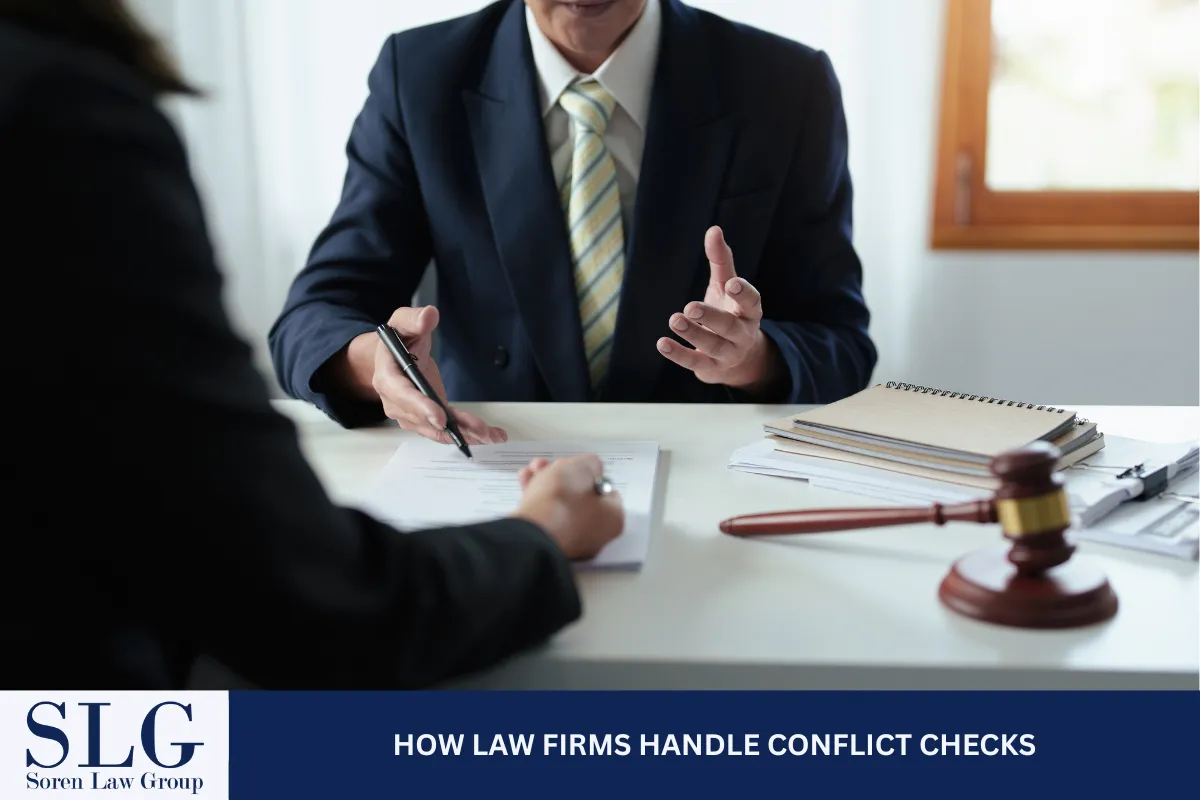
When anyone—spouse or ex-spouse—contacts a Staten Island law firm for a divorce consultation, the firm’s intake team performs a conflict of interest check. Here’s how it usually works:
- Intake Form: At the start of each consultation—or even when you call—a staff member asks for the names of key people involved (you, your spouse, etc.).
- Conflict Database: The firm searches a computer system or conflict log to check if they have spoken with, represented, or are connected to anyone with adverse interests in your matter.
- Conflict Rules: If they previously gave confidential legal advice to your spouse (or even a prospective client) on a substantially related matter, the lawyer is conflicted out.
Law firms may use confidentiality disclaimers before consultations, explaining that sharing sensitive details may affect representation.
What Information Creates a Conflict of Interest?
Not every conversation with a divorce attorney leads to a conflict in of situation. For a real conflict of interest, the prospective client must share confidential information that is:
- Significantly Harmful: Details that, if revealed, would hurt the client’s position (e.g., plans for property settlement or custody disputes).
- Substantially Related: Topics closely connected to the divorce, like marital property division, child custody, spousal support, or plans for negotiation in court.
If the information is general (like asking about legal fees or court process in New York), it may not create a conflict. But confidential dealings closely tied to your marriage or divorce process almost always constitute an ethical bar.
Can Conflicts Be Waived?
Sometimes, both parties might agree to let an attorney represent one of them, even if a technical conflict exists. This waiver must meet strict legal ethics rules:
- Informed Written Consent: Both sides must get a clear explanation of the risks and must sign off, knowing and agreeing to the continued representation.
- No Material Harm: The lawyer cannot use significantly harmful information gained from the prospective client.
- Screening: Sometimes, law firms can screen the conflicted-out attorney from the case, walling them off from all involvement (an “ethical wall,” previously called a “Chinese wall”), and not sharing fees.
Conflicts involving materially adverse or harmful information usually can’t be waived. If it’s a non-waivable conflict, the attorney is permanently disqualified.
What Happens if You’re Conflicted Out of Multiple Firms?
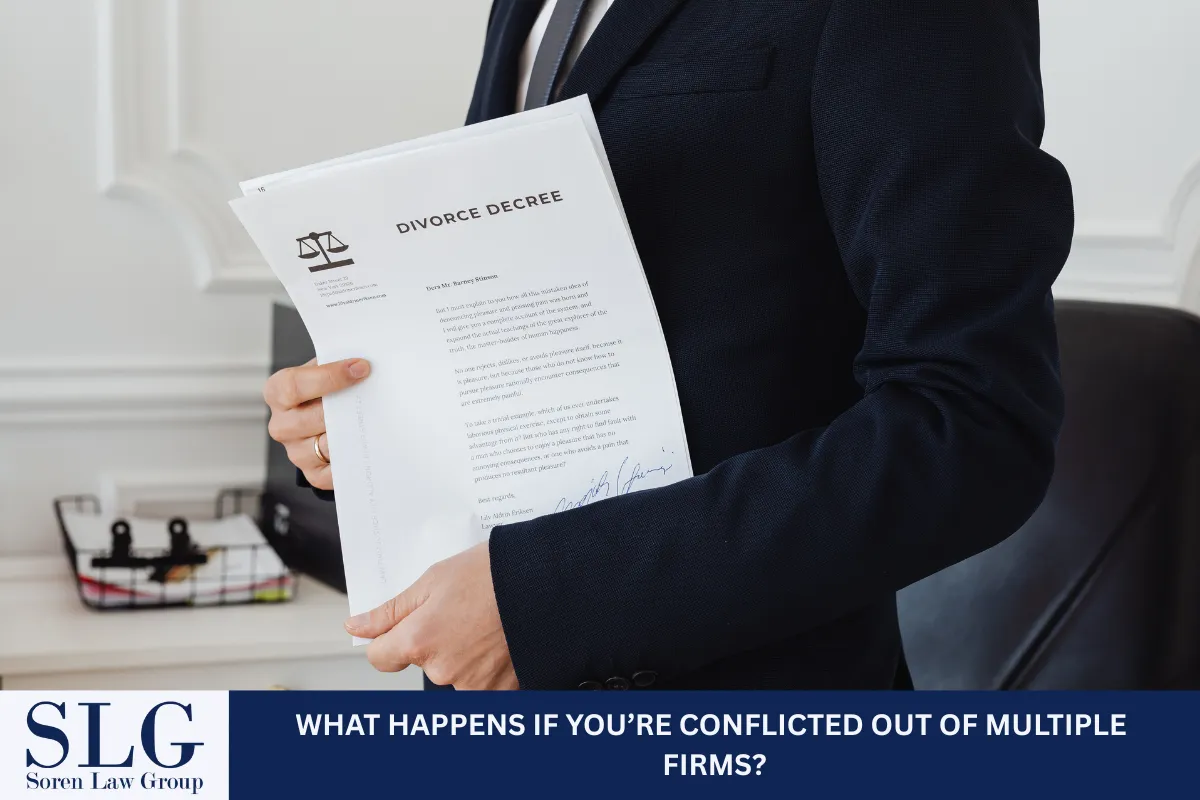
If your spouse or opposing party meets with all the top divorce lawyers in Staten Island early on, you may encounter repeated “sorry, conflicted out” responses. This can feel deeply unfair, especially in a contested divorce or a Family Court hearing.
Options if you’re conflicted out include:
- Broaden Your Search: Consider reputable family law attorneys in the surrounding region. Sometimes, lawyers from neighboring counties may take your case.
- Challenge the Disqualification: If you genuinely need a specific attorney and believe the other side consulted firms only to block you, your lawyer can file a motion asking the court to reevaluate the disqualification.
- Prove Bad Faith: If there’s evidence that your spouse engaged in attorney shopping solely to abuse the legal process, judges can balance fairness and may allow your chosen lawyer to participate.
- Seek Referrals: Bar associations may have lists of available divorce attorneys who haven’t been conflicted out.
Courts have discretion and try to balance prejudice versus choice of counsel, especially if dirty tricks are suspected.
Is It Legal or Ethical to Conflict Out All the Best Lawyers?
There is a fine line between protecting your right to legal representation and abusing the conflict-out process. While it’s not illegal to consult with several divorce lawyers to gather opinions, actively trying to block your spouse’s access to all the best attorneys is considered unethical and can lead to:
- Sanctions: Courts may penalize parties for bad faith, gamesmanship, or abuse of process.
- Disqualification Motions: If your spouse tries to disqualify your chosen legal counsel for improper reasons, the court may investigate and grant exceptions.
- Ethics Complaints: State bar associations or disciplinary authorities can review allegations of improper conduct.
Repeated bad-faith consultations can undermine your own credibility and possibly jeopardize your divorce proceedings.
How Attorneys Respond to Multiple Consultations

Experienced Staten Island divorce attorneys and family law attorneys are aware of conflicting out tactics and have firm-wide policies to address them. Ethics and court rules shape their approach:
- Limited Scope Consultations: Some lawyers offer brief, general consultations with confidentiality disclaimers to avoid receiving sensitive details.
- Conflict Checks: Strict intake procedures ensure timely and effective screening.
- Non-Engagement Letters: Law firms may issue a declination letter stating they cannot represent you.
- Confidentiality Safeguards: Law firms may limit intake information to avoid unnecessary conflicts.
- Notice to Opposing Party: The firm may notify the other party about screening procedures if necessary.
All these steps are designed to ensure ethical behavior and fairness for both spouses during divorce.
Prevention and Protection from Being Conflicted Out
If you suspect your spouse might try to block your access to the top divorce attorneys, act quickly and smartly:
- Contact Your Preferred Attorney Early: Reach out to your first-choice law firm or divorce lawyer promptly.
- Be Careful in Sharing Details: In initial consultations, share only enough to determine suitability. Don’t reveal strategies or details unless you’re sure you want that attorney.
- Consult Multiple, But Not All Attorneys: Overlapping consultations may reduce your choices—and signal bad faith if overused.
- Request a Confidentiality Disclaimer: Ask the attorney how they handle confidential information and potential conflicts of interest.
- Document Communications: Keep records in case you need to prove your intent was genuine.
Being proactive and informed protects your rights and avoids unnecessary conflict.
Impact of Being Conflicted Out on Divorce Representation
Getting conflicted out of your local divorce lawyers can feel overwhelming, especially during a contested divorce with property settlement, custody disputes, or spousal support negotiations. But you are not powerless:
- Alternate Legal Counsel: Broaden your search for legal representation to include reputable attorneys in adjacent areas or remote options.
- Ask for Referrals: Local bar associations or the court can help you find a family law attorney.
- File a Motion: If you believe you were unfairly blocked, your attorney may request the Family Court to allow representation.
- Protect Your Rights: Don’t delay—quick action helps ensure you have experienced support.
Remember, the legal ethics rules and court rules are designed to protect both sides from unfairness during divorce proceedings.
Staten Island Divorce Attorney – Soren Law Group
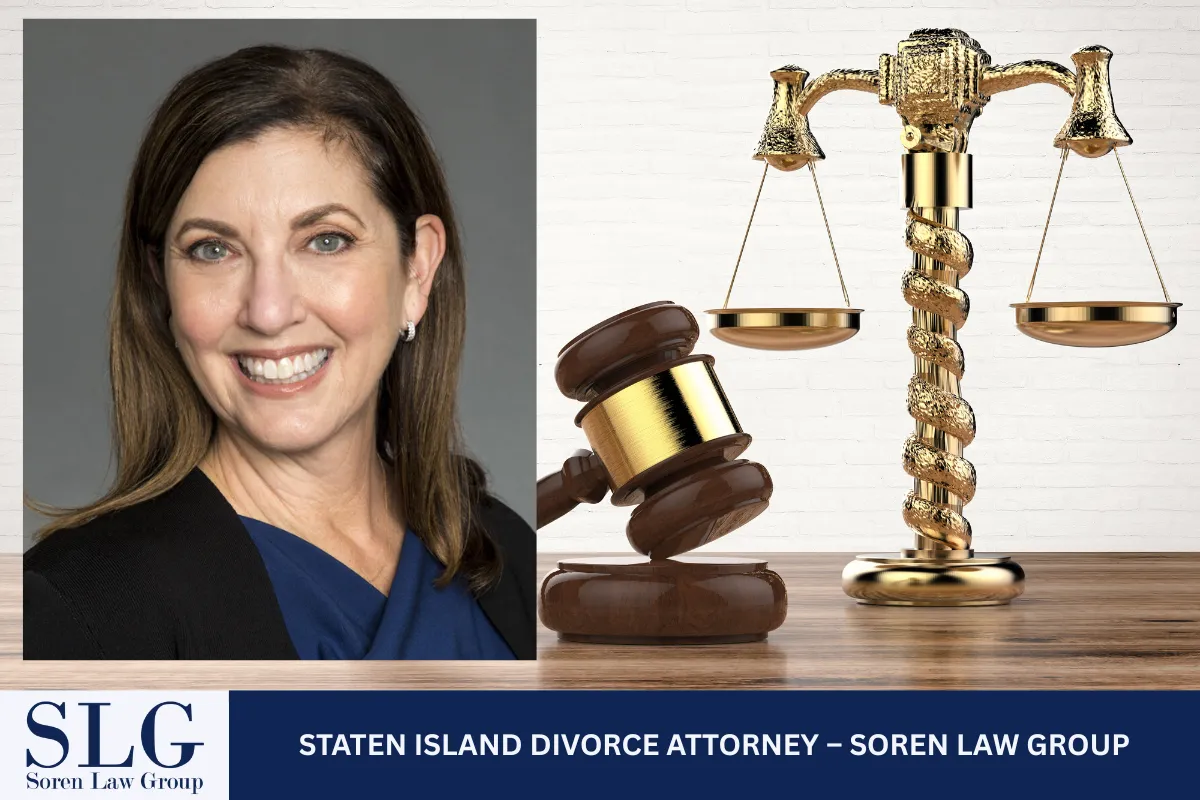
Are you searching for a trusted divorce attorney in Staten Island, only to be told you’re “conflicted out”? At Soren Law Group, we understand how stressful and frustrating this process can be. Our experience with conflict of interest issues means we know how to protect your rights, even if other firms have shut you out. The divorce process is hard enough—don’t let legal technicalities stand in your way. Let us guide you through your options, explain the “conflict out” system, and advocate for your best interests.
Call us today at (718) 815-4500 to schedule a confidential consultation. We are here to help you through every step of your divorce!
Common Questions About Conflicted Out Divorce Attorneys in Staten Island
1. Can my ex-spouse hire a divorce attorney I consulted with previously?
In most cases, your ex cannot hire a divorce attorney or family law attorney you already consulted if you shared confidential information about your case. The Rules of Professional Conduct require that attorneys avoid conflicts of interest and prevent the use of confidential information against you. Even if you did not formally hire that attorney, your discussion as a prospective client may be enough to create a conflict. However, if the consultation was extremely brief and no significant confidential details were shared, some exceptions may apply. If a conflict is disputed, a court may hold a hearing to determine whether the attorney should be disqualified.
2. Is it possible for someone to “conflict out” every good divorce attorney in an area?
While in theory someone could consult every reputable divorce attorney in Staten Island to prevent their spouse from hiring one, courts frown upon this tactic. Most law firms recognize attorney shopping and may limit what they disclose during initial consultations. Family Court judges may override a conflict if they find the consultations were done in bad faith, prioritizing fairness and both parties’ access to legal representation. If you face this issue, courts may even order relief or sanctions against the abusive spouse.
3. What steps do law firms take to identify conflicts during the intake process?
Law firms use a conflict database or conflict log to track clients, prospective clients, and relevant parties. During your intake process, staff will ask for the names of everyone involved in your divorce. Then, they cross-check these names against their system to ensure no lawyer at the firm has a conflict of interest. If a possible conflict is found, the law firm may decline to meet with you or limit the consultation to generic legal advice. This careful screening protects all parties and maintains legal ethics.
4. Are there any ways to waive a conflict if both parties want to use the same attorney?
In rare cases, conflicts can be waived if both parties give informed written consent. The attorney must clearly explain the risks of representation and obtain written agreement from both spouses. Legal ethics rules tightly control this process and require that the lawyer avoid representing clients with directly opposing interests in a substantially related matter. If the information shared was significantly harmful or if the matter is a contested divorce with adverse positions, courts may prohibit waivers for protection.
5. What should I do if I discover I have been conflicted out of most local divorce attorneys?
If you find yourself conflicted out of many experienced law firms, act quickly to safeguard your rights. Look for reputable attorneys outside Staten Island, consider remote consultations, and get referrals from local bar associations. Document situations where you believe your spouse is abusing the process, gather evidence of bad faith if possible, and contact the court for relief. Quickly securing legal representation ensures your interests in vital areas such as marital property division, custody disputes, child support, and property settlement are not compromised.
Read more: Staten Island Divorce Attorney: What Will I Lose if I Get Divorced?

